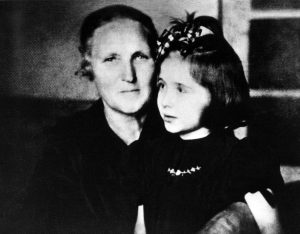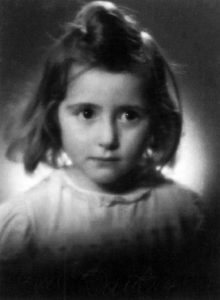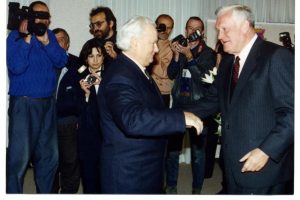Ariela Abramovich Sef
IN THE GHETTO
Today is May 9th, Victory Day (1). For me it is the most important holiday of all – more important than New Year or Passover.
I was born at the end of October 1941. It was a premature birth at 12, Raguchyo Street during a round-up in the Kaunas Ghetto, when the Germans were approaching Moscow. It was very bad timing, but there was nothing to be done and when I was only five days old I went, or rather I was taken, wrapped up against my mother’s breast – to the “Great Action” (That was when the ill, the elderly, cripples and new-born babies were selected and sent off to die or, to use the German term, to do “lighter labour”, while the young and healthy were sent off to work “for the good of Germany”).
All the Jews were driven out into Democrats’ Square, which was cordoned off. Early that morning the Lithuanian volunteer policemen, who called themselves partisans, had started searching all the flats, every single cellar and attic, emptying the whole Ghetto. The SS commander, Rauca, had been in charge of the whole operation. He was standing on raised ground, so as to get a better view of the crowd: people were walking along in groups, in families, in households. The “Selection” began. Rauca pointed with his truncheon to indicate who should go to the right and who to the left. He was separating families. Relatives were pushing and straining towards each other. People did not yet realize that Right meant death and Left life. It was very cold. People were becoming more and more agitated.
Our relatives clustered tightly round me and my mother. We managed to go to the Good side, the whole of our family except Grandmother. She was old and wise – a woman, who understood everything that was going on: so as not to upset her family, she had hidden in the crowd of those ‘selected’ for death. Everyone was very worked up. Then suddenly, as I was told later, my father took three leaps over to the Bad side, hunted out and literally dragged Grandmother out of the crowd. Then with his mother, who was not aware of what was going on, he ran back to the Good, side. When they tried to stop him amidst the heart-rending weeping, noise, barking of dogs, the curses and lashings meted out by the Lithuanian Polizei, Father ran up to an officer and explained to him in fluent German that he had been given permission to go and fetch his mother.
“Who gave you permission?”
“Why did they give you permission?”
“What error was made?”
Before they had time to realize what was happening, Father had brought Grandmother back to the vital side.
Later my father used to be asked: “How come you weren’t afraid. You could have been shot. You’re a hero!”
“What d’you mean ‘hero’? I was simply frightened, more than everyone else. That’s why I ran”.
When life was calm and peaceful, Father was often plagued by doubts, but in serious situations I don’t really know anyone who could be more decisive. That was how he saved Grandmother.
It was more than likely that he saved our mother too on one occasion. In a garden plot next to the house where they lived Mother pulled up a carrot one evening in the dark thinking nobody would see her, but a high-ranking German officer caught her in the act. He stopped her there and then, but because he was hurrying somewhere at the time, merely instructed to report to the commandant’s office the next morning. She was bound to have been given a harsh punishment for thieving. When he first caught pinching the carrot, the officer had clearly not had time to deal with the matter. When our father came home at the end of his work shift, he found mother sobbing. It was clear that she might well be shot or, at best, be sent to the nearby camp. She kept asking:” What shall I do, what shall I do? Who will there be to look after the baby?”
Father replied in a tired, utterly calm voice, sounding even slightly indifferent: “Don’t do anything, don’t go”.
Mother did not go…
All the members of our family on Father’s side, with the exception of Uncle Beno, were granted a little longer to live.
When it became known that there was going to be another raid my Father said firmly: “Ariela’s not going to be rounded up”.
Sometimes children were placed outside the Ghetto fence or gates and would be picked up by friends or acquaintances or just complete strangers. We did not have any friends to hand.
Father gradually came round to the idea of hiding me – come what may. The other relatives regarded him as a madman. They all decided he was out of his mind, but like a paranoid he went on saying “I’m going to throw her out of here”.
The family was a warm, close-knit one and all our relatives lived close by. His sister and brothers and his parents begged him not to: “Such a lovely child! We’ve all been feeding her. You go off to work, but the child’s not even hungry. Just look how pretty she is, how beautiful”.
Grandfather kept on saying: “She’s not just a baby. She’s a picture. What will happen to all of us? If something happens, perhaps God will help”.
Father replied that he could not take the risk and nor did he intend to start negotiating with God…
I spent two years in the Ghetto. The family accepted its fate. We behaved just like the rest. Our relatives and all the other tenants of our communal flat used to feed and clothe me. They knitted me little dresses and socks out of old jumpers. At that time hardly any children were being born in the Ghetto. If the Polizei came across any new-born babies, they were killed straightaway. By the time I was 18 months old, I knew all too well which of the neighbours would be eating their dinner where and when. I would make sure to be in the right place at the right time and by the right door. I was even nicknamed the “little white gypsy”.
My father, being a doctor, could have worked actually in the Ghetto, but because of me he used to work with a special brigade out at the aerodrome, to which he and his fellow workers would be sent out under escort to break up the remains of shot-down Soviet aircraft, or “Stalintsy” as they were known. The work was physically much harder, but there were far more ‘perks’.
My father had been on duty in an army hospital when the War began. When he heard that the Germans were marching into the town, he telephoned the medical director of the hospital and said: “The Germans are coming and we need to do something with the patients”.
The reply came back: “Don’t stir up panic, things will get sorted out without you”.
In short, Father never saw that doctor again, but he did not have time to get away himself. My parents were marooned in occupied Lithuania. Father, his brother Beno and my mother were arrested as Leftists and Communist sympathizers in a matter of only a few days after the German invasion. They released my pregnant mother, but Father did not think that he would get out alive. Mother gave him some gold jewellery to take with him, just in case. He gave it to his brother hoping that Beno would manage somehow to escape, but he was convinced that he himself was going to be shot by the Germans. In the end everything turned out the other way round. His brother was led off and shot straight away in the Seventh Fort, but my father, thanks to efforts by Mother, who ran round to all the Lithuanian army doctors she could find, under whom her husband had worked before the War, was released thanks to help from Professor Zilinskas.
While Father was still in prison, Germans broke into our flat accompanied by some Lithuanians. A caretaker or servant must have tipped them off. They came in two lorries armed with a list. The list they had was very precise. Mother’s belongings made the visit worthwhile: they took everything she had inherited from her mother (pictures, silver, diamond necklaces purchased at various auctions when she was travelling in Western Europe). She had also inherited all the family valuables. Her mother had only left Lithuania for Palestine in 1940 and by then she had not been able to take anything with her.
Some German or Lithuanian had pushed his pistol up against my pregnant mother’s belly and demanded she bring out all the items on the list. She did not resist. Everything was accessible, nothing was locked away. So they took everything, literally everything, including the furniture. The lorries drove off crammed to the top and when Father was released, the two of them were some of the last to set off to the Ghetto without furniture and without belongings. With ‘luggage’ like that, a small room in a communal flat was ample.
After the War my mother became completely indifferent to material belongings. Her interest in anything like that had vanished completely. She no longer bought expensive furniture, dresses or jewellery, although such opportunities presented themselves and naturally offers were made to her. Beautiful pieces in those days could be had for a song. All she had, as far as I can remember, were two or three dresses from the pre-war days: there were also a blouse and cardigan and a threadbare astrakhan coat bought in a commission store and full of darns and patches. That was the only winter coat she had right up until the time she left for Israel.
When I was born, we were given a wickerwork cot – a left-over of bygone luxury. It was the main ornament of our little room at 31, Ariogalos Street, to which we had to move within the Ghetto.
Our neighbours for the most part were educated people. My main friends and mentors were the neighbours’ two boys – 11-year-old Beba and 9-year-old Veva Mintz. Before the War their father had been a professor of philosophy or chemistry (I can no longer recall which), but in the Ghetto he fell sick, he was in acute pain because his stomach ulcer had flared up again and completely incapable of heavy physical labour. At work, Father used to exchange their ‘valuables’ for food. Other people not employed in his work-team, who were unable or unwilling to take risks, used to give him their belongings as well. Father used to barter very honestly and quite successfully. Admittedly there was one occasion when he was given a whole can of oil, which turned out to be motor oil, not cooking oil. There were several cases of deception like that (May those scoundrels rot in Hell).
Before the War Father had never sold anything, let alone engaged in barter, despite the fact that he was descended from a family of merchants. My grandfather and two uncles had traded in fabrics, while my father – the youngest of seven children – had studied medicine in Paris and then started work as a junior hospital doctor. He had come back on a temporary visit to Lithuania for a short period of military service and had also worked as a doctor in the Army. When it came to practicalities though, he could not even boil an egg. He had been planning to go back to France after his military service and then go to French Canada for two years to enable him to obtain French citizenship and the right to permanent work.
Strange though it may seem, in the Ghetto my uncles turned out to be less adaptable, less healthy and older than their years. My grandfather was very old and the only young and healthy member of the family to find his bearings was my father. Admittedly though, he was the only one with a baby. Initially his brother, Ruvim, was in the same work-team and also Max and his beautiful daughter, Rivochka.
The local inhabitants used to go over to the Jewish prisoners and were only too happy to barter with them. The Jews risked being shot, but they had no choice and so they took risks. In the very beginning the Germans used to look the other way. Most of the guards were old soldiers, who had been through the First World War: they were serving in the rear, almost too old still to be in the Army. They were not malicious in the least and it was possible to come to an understanding with them, especially for those prisoners who had a good command of German. This applied in my father’s case. They knew that he was the doctor in his work-team, who had studied in Paris and they were prepared to forgive him a good deal. One German officer even said to him: “I’m ashamed to be a German now”.
On one occasion, my father managed to come to the rescue of an unlucky barterer, a clumsy man in glasses. He became so carried away with his dealing that he would have been shot, if my father had not stepped in with some far-fetched explanation. The man in question, by the name of Yakov Rabinovitch, became the editor of the German newspaper Allgemeiner Journal in America and he sent us a letter from Canada, after learning of my father’s fatal accident, saying how grateful he had been to our father, who had helped him and other prisoners. It would not have been possible for Father to have accomplished as much as he did, if he had been up against Lithuanian policemen instead of old German soldiers.




